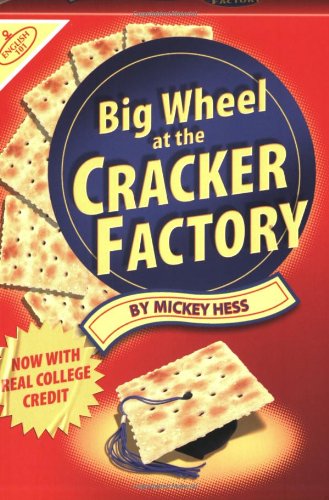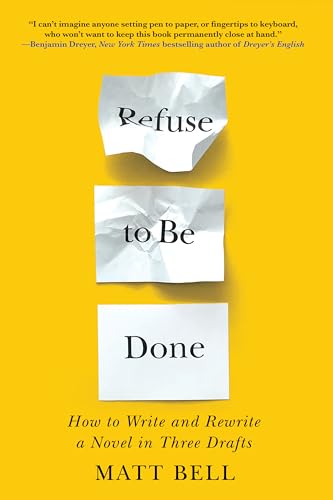 Joe Meno’s most recent novel, The Great Perhaps, is a beautiful and entertaining tragicomedy about the Casper family: scientists Jonathan and Madeline, their complicated teenage daughters, Amelia and Thisbe, and Jonathan’s father, Henry, who is willing himself to disappear, speaking fewer and fewer words each day. Meno is the author of four other novels, including Hairstyles of the Damned, and his most recent story collection, Demons in the Spring, was a finalist for the fifth annual Story Prize.
Joe Meno’s most recent novel, The Great Perhaps, is a beautiful and entertaining tragicomedy about the Casper family: scientists Jonathan and Madeline, their complicated teenage daughters, Amelia and Thisbe, and Jonathan’s father, Henry, who is willing himself to disappear, speaking fewer and fewer words each day. Meno is the author of four other novels, including Hairstyles of the Damned, and his most recent story collection, Demons in the Spring, was a finalist for the fifth annual Story Prize.
The Millions: I had this sensation when reading The Great Perhaps that its form was continually unfolding and revealing itself to me. For instance, we’ve got an elevated third person narrator that also manages to swoop deeply into various characters’ perspectives; we’ve got short narratives about various Casper ancestors; we’ve got Jonathan’s father Henry writing letters to himself about his past – and so on. This sensation of formal evolution was exhilarating, perhaps because it never felt inaccessible. Did you plan to write a book that shifts in these formal ways? And why these particular narrative choices?
Joe Meno: When I first started writing the book I had no idea what it was about or how to tell it, other than I wanted to try and tell the story of a family in the weeks leading up to the 2004 election. After I finished the first draft, I realized the book was about complexity, and the need for it, and how terrified we, as Americans, seemed to have become of anything complicated or uncertain. As I started rewriting and organizing the book I realized that in order to get to the complexity of the character’s lives, I would need a structure that was also complex, so I started using different forms for each character as a way to develop who they were – Jonathan, a paleontologist, has various abstracts from his published scientific journals, his wife, Madeline, an animal behaviorist, has her chapters structured like field notes, their daughter Amelia, a budding Marxist, has excerpts from her angry anti-capitalist rants in the school newspaper, their other daughter, Thisbe, has these very violent prayers she has made up, and their grandfather, Henry, has these letters he writes to himself as a way to rid himself of his connections to the past.
TM: There’s a notion in your novel that cowardice and failure can be inherited. Do you think the book supports or disproves this theory – or does it do both?
JM: Actually, I did a lot of research looking at the theories concerning the heredity of personality traits, and there’s a lot of evidence that our behaviors are not only influenced by role models like our parents, but also by the genes they pass on through these structures called epigenes, which is fascinating and also really, really horrifying. I think, in the end, that all humans, who on some basic level are all genetically related, have the very real potential for stunning acts of cowardice, and at the same time, the possibility for kindness and bravery. When you think about the last eight years of our country’s history, you can see obvious examples of both, oftentimes committed by the very same people. The characters in the book all prove they are affected by a real sense of fear, and by the end of the novel, they all have a chance to face their cowardice, which in their own way, all of them do.
TM: There’s also a theme of familial roles in the book, and for the Casper family, a pattern of going outside of their prescribed boundaries. For instance, Madeline decides to tell her eldest daughter, Amelia, about a sexual moment with a work colleague, and, at one point, Amelia goes to watch Jonathan teach because she longs to see him as a professor rather than as a father. I wonder, starting out, what your notions of this particular family’s traumas and dysfunction were. Did these characters change as you wrote them?
JM: I think one of the reasons the family in the book is so unhappy is that each of them, in their own way, has decided that there is one thing in life that will help them understand everything – for Jonathan, it’s this squid, which he thinks if it can be found, will help prove the theory of evolution. There’s Madeline and her ideas about social dominance, and Amelia and Marxist politics, and Thisbe and her troubling sense of religion, and Henry, who is trying as hard as he can to escape the complications of history. It took me a long time and a lot of writing to figure out how they worked on their own, and then together. What becomes apparent is how lonely they are in each other’s company, because they’re all failing to see how none of those perspectives are mutually exclusive, and how we need all of those ways of understanding to make sense of the complexities of the world.
TM: The book’s terrific first line, “Anything resembling a cloud will cause Jonathan Casper to faint,” echoes throughout the novel, and I found myself noting each varied cloud reference. For example, Madeline follows a man-shaped cloud, and the younger sister, Thisbe, in an exalted, erotically charged moment with a friend, notes the “cloudless field hanging above them.” Are all these diverse cloud references examples of “a great unknowable entity” as mentioned near the end of the novel? Am I meant to desire a simplicity of metaphor, or symbolism, and not get it? How conscious of the cloud imagery were you as you wrote this book?
 JM: I think because the book is so expansive and follows five main characters and several centuries in the family’s overall history, I needed something to connect the different family members, and the image of the cloud became the thing that made the most sense. The first line, like the book itself, was definitely influenced by Kurt Vonnegut’s Slaughterhouse Five. In the intro to his book, he discusses how writing an anti-war novel is like writing an anti-glacier novel. For some reason, that idea haunted me: what was it about a glacier? The more I thought about it and the more I wrote the book, the more I realized that what I think he might have meant is that war, like all human conflicts, is unavoidable, it’s part of the way the natural world works, and so it’s inescapable. I used a similar image – a cloud – which is also part of the natural world, and is also pretty impossible to avoid. The other thing about the cloud is that it’s amorphous, ever-changing, unclear, which speaks directly to the way all of the characters see the world in which they’re living. To me, that’s what’s necessary or beautiful about the image: they’re the physical manifestation of the idea of uncertainty or complexity.
JM: I think because the book is so expansive and follows five main characters and several centuries in the family’s overall history, I needed something to connect the different family members, and the image of the cloud became the thing that made the most sense. The first line, like the book itself, was definitely influenced by Kurt Vonnegut’s Slaughterhouse Five. In the intro to his book, he discusses how writing an anti-war novel is like writing an anti-glacier novel. For some reason, that idea haunted me: what was it about a glacier? The more I thought about it and the more I wrote the book, the more I realized that what I think he might have meant is that war, like all human conflicts, is unavoidable, it’s part of the way the natural world works, and so it’s inescapable. I used a similar image – a cloud – which is also part of the natural world, and is also pretty impossible to avoid. The other thing about the cloud is that it’s amorphous, ever-changing, unclear, which speaks directly to the way all of the characters see the world in which they’re living. To me, that’s what’s necessary or beautiful about the image: they’re the physical manifestation of the idea of uncertainty or complexity.
TM: One of the two epigraphs is by Kurt Vonnegut: ‘One of the great American tragedies is to have participated in a great war.’ The novel takes place in 2004, during the presidential elections, and Madeline in particular is troubled by the war in Iraq. How and why did you work these real current events into the scope of the story?
JM: I actually began writing the book thinking directly about the war and then the book grew from there. For me, as I look back over the eight years of the Bush Administration, what most strikes me is how cleverly they used fear over and over again to push forward their agenda, and how, over and over again, we as Americans allowed ourselves to be manipulated by this fear, especially during the lead-up to the invasion of Iraq, and then again during the weeks before the election. Like Madeline, I was completely uncertain about the war in Iraq: I was unsure of whether it was right or wrong, like most of the country at the time, and part of me, I think, was hoping not to have to think about it at all. My recollection is that there was very little debate and with some distance, I feel particularly ashamed of how fearful as a nation we had allowed ourselves to become. Writing the book was a way for me to try and make sense of the choices we made or didn’t make.
TM: One of my favorite aspects of your book is the humor and tragedy with which you depict the teenage lives of Thisbe and Amelia. At one point, Thisbe prays, “Dear Lord… let the wire in my bra poke through my heart,” which is just, well, awesome. Are you, in fact, a teenage girl in disguise? How did you get inside these complicated – and very different – young minds?
JM: I am not, in fact, a teenage girl. But I am writer which is pretty darn close. Amelia was based somewhat on someone I knew and worked with, at least as a starting point. As I was working on her character, I realized how angry and unappealing she seemed and so I felt like I no choice but to add some humor to temper her rancor. Thisbe, in secret, is kind of my favorite character in the book. Although she is really confused and definitely a kind of zealot, what she really wants is to make sense of her family and herself and her feelings towards Roxie, a classmate. I think she’s a pretty fair example of why evangelical Christianity is so appealing to some, because in the end, it’s based on a search for understanding through love. This is also why it is so insidious and threatening as well. Like Thisbe, trying to oversimplify the world only undercuts what seems so miraculous about life in the first place.
TM: And, because this is a book site, I must ask you: What’s the last great book you read?
JM: Mickey Hess’ non-fiction masterpiece, Big Wheel at the Cracker Factory. It’s about an assistant professor who’s forced to take all these weird day jobs – ice cream man, house-sitter, actor at a haunted house – while he tries to negotiate the transition from one part of his life to the other.








